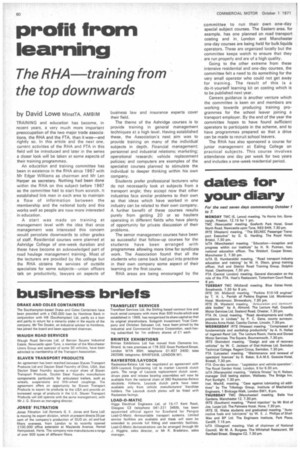profit from learning
Page 66

If you've noticed an error in this article please click here to report it so we can fix it.
The RHA training from the top downwards
by David Lowe MInstTA, AMBIM
TRAINING and education has become, in recent years, a very much more important preoccupation of the two major trade associations, the RHA and the ETA, than it was—and rightly so. In this article and the next one, current activities of the RHA and FTA in this field will be introduced and later in the series a closer look will be taken at some aspects of their training programmes.
An education and training committee has been in existence in the RHA since 1967 with Mr Edgar Williams as chairman and Mr Len Harper as secretary. Nothing had been done within the RHA on this subiect before 1967 so the committee had to start from scratch. It established link men in each area to maintain a flow of information between the membership and the national body and this works well as people are now more interested in education.
A start was made on training at management level with the idea that once management was interested this concern would percolate downwards to other grades of staff. Residential courses were planned at Ashridge College of one-week duration and these have become an acknowledged part of road haulage management training. Most of the lecturers are provided by the college but the RHA obtains the services of outside specialists for some subjects—union officers talk on productivity, lawyers on aspects of business law and insurance experts cover their field.
The theme of the Ashridge courses is to provide training in general management techniques at a high level. Having established these, the Association's next aim was to provide training on many of the individual subjects in depth. Financial management; personnel and industrial relations; marketing; operational research: vehicle replacement policies; and computers are examples of the specialist courses planned to stimulate the individual to deeper thinking within his own company.
Students prefer professional lecturers who do not necessarily look at subjects from a transport angle; they accept now that other industries face similar problems to their own so that ideas which have worked in one industry can be related to their own company. A further benefit of these courses results purely from getting 20 or so hauliers operating in different fields who have plenty of opportunity for private discussion of their problems.
The senior management courses have been so successful that follow-up courses for the students have been arranged with programmes allowing more time for syndicate work. The Association found that all the students who came back had put into practice in their own company some aspect of their learning on the first course.
RHA areas are being encouraged by the committee to run their own one-day special subject courses. The Eastern area, for example, has one planned on road transport costing and in, London and Manchester one-day courses are being held for bulk liquids operators. These are organized locally but the committee keeps watch to ensure that they are run properly and are of a high quality.
Going to the other extreme from these intensive residential and one-day courses, the committee felt a need to do something for the very small operator who could not get away for training. The result of this is a do-it-yourself learning kit on costing which is to be published next year.
Careers guidance is another venture which the committee is keen on and members are working towards producing training programmes for the school leaver joining a transport employer. By the end of the year the committee hopes to have found sufficient operators to participate in the scheme, and to have programmes prepared so that a drive can be made to recruit school leavers.
The RHA has also sponsored a course for junior management at Ealing College on practical subjects. This course involves attendance one day per week for two years and includes a one-week residential period.


















































































































